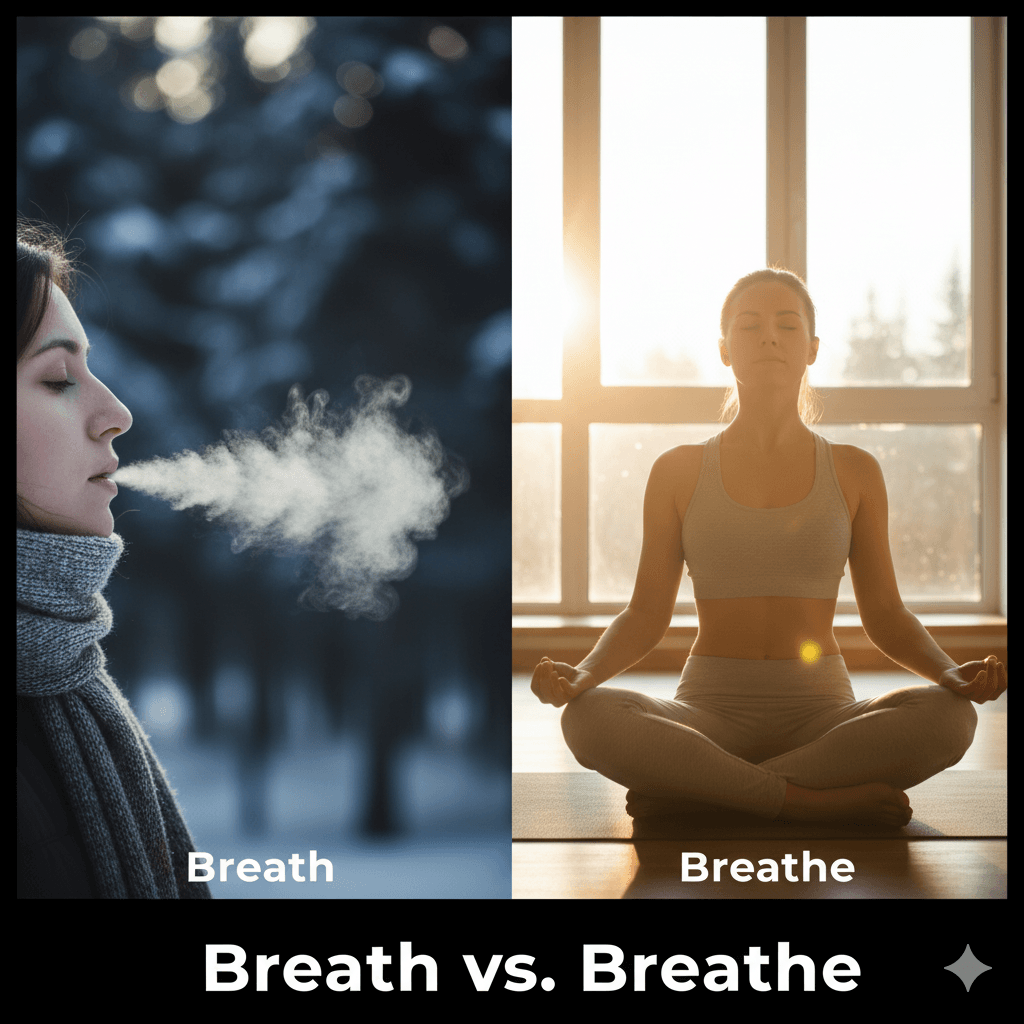Breath vs. Breathe: What’s the Difference?
 The words breath and breathe are closely related but not interchangeable.
The words breath and breathe are closely related but not interchangeable.
Here’s the quick difference:
- Breath (noun) → the air you take in or let out.
- Breathe (verb) → the act of taking in or letting out air.
Let’s break that down step by step.
Breath: The Noun (Thing)
Meaning
“Breath” is a noun — it refers to the air you inhale or exhale from your lungs.
You can take a breath, hold your breath, or run out of breath.
Examples (10 total)
- Take a deep breath.
- She held her breath before diving in.
- He was out of breath after running.
- The cold air took my breath away.
- Don’t waste your breath arguing.
- The runner stopped to catch his breath.
- His breath smelled like coffee.
- She spoke under her breath.
- He took a long breath before answering.
- The mountain air felt crisp with every breath.
🧠 Tip:
If you can count it (a single breath, deep breath, etc.), it’s breath.
Breathe: The Verb (Action)
Meaning
“Breathe” is a verb — it means to take air into your lungs and let it out.
You can breathe in, breathe out, or breathe deeply.
Examples (10 total)
- Just breathe and relax.
- He could hardly breathe in the smoke.
- Breathe slowly during yoga.
- Doctors told him to breathe deeply.
- I love to breathe the fresh morning air.
- She breathed a sigh of relief.
- The patient can’t breathe on his own.
- The city seems to breathe energy at night.
- Close your eyes and breathe out stress.
- He finally breathed again after panicking.
🧠 Tip:
If it’s something you do, it’s breathe (with an “e”).
Pronunciation Difference
| Word | Pronunciation | Sound | Part of Speech | Example |
|---|---|---|---|---|
| Breath | /breθ/ (like “death”) | Short “e” sound | Noun | Take a deep breath. |
| Breathe | /briːð/ (like “leave”) | Long “ee” sound | Verb | Don’t forget to breathe. |
💡 Tip:
The extra “e” in breathe makes the vowel sound longer — “ee.”
Common Expressions
| With Breath | With Breathe |
|---|---|
| Take a deep breath | Breathe in / Breathe out |
| Catch your breath | Breathe easy |
| Hold your breath | Breathe life into something |
| Out of breath | Hard to breathe |
| Under one’s breath | Breathe a sigh of relief |
How to Remember the Difference
👉 Breath = noun (thing) → short, like a single puff of air.
👉 Breathe = verb (action) → longer word, longer sound (“ee”), it’s what you do.
💡 Memory Trick:
You breathe air to take a breath.
Common Mistakes
❌ Take a deep breathe.
✅ Take a deep breath.
❌ I can’t catch my breathe.
✅ I can’t catch my breath.
❌ He needs to breath slowly.
✅ He needs to breathe slowly.
Why It’s Easy to Mix Them Up
They differ by just one letter, and both relate to air or breathing.
Even native speakers mistype them, especially when writing fast.
That’s why tools like Humanizey help correct small but important errors automatically — keeping your writing natural and accurate.
FAQs
1. Is “breathe” a noun or verb?
Breathe is always a verb — it describes an action.
2. Can “breath” be plural?
Yes — breaths (e.g., Take a few deep breaths).
3. How do I pronounce “breath” vs. “breathe”?
Breath = short “e” sound; breathe = long “ee” sound with a soft “th.”
4. What does “breathe easy” mean?
It means to relax after worry or stress.
Practice: Choose the Correct Word (“Breath” or “Breathe”)
(Answers are listed at the end.)
- Take a deep ___ before jumping in.
- Remember to ___ when you feel anxious.
- She was out of ___ after running.
- It’s so cold I can see my ___.
- I can’t ___ in this tight space.
- Close your eyes and ___ deeply.
- He held his ___ while waiting for the results.
- You can ___ easier now; it’s over.
- The room fell silent — no one dared to ___.
- The mountain air took my ___ away.
Answers
- breath
- breathe
- breath
- breath
- breathe
- breathe
- breath
- breathe
- breathe
- breath
